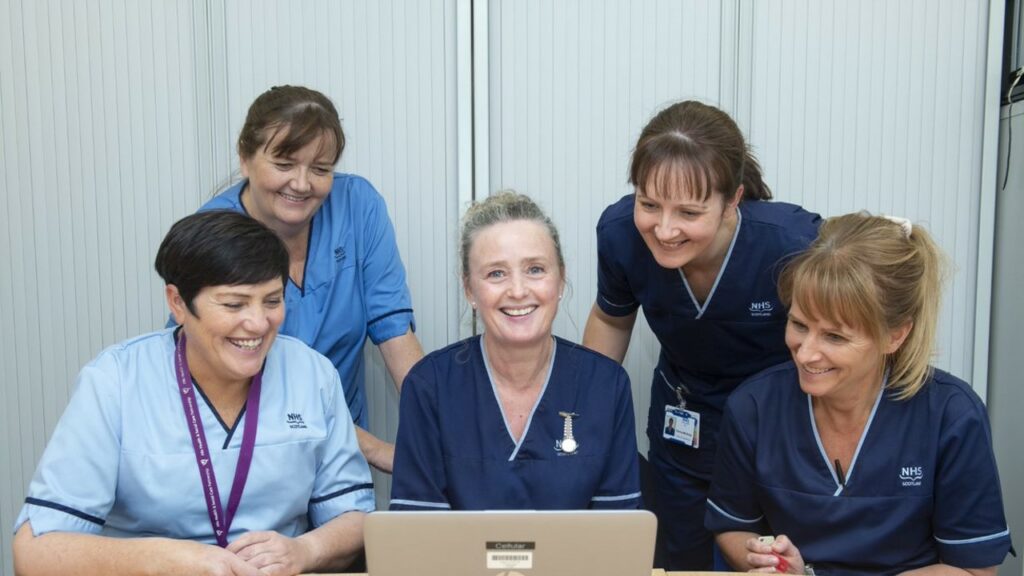
This photo was taken prior to the COVID-19 pandemic and the introduction of social distancing guidance.
My experience of the SPDN qualification and the value it has on my professional practice
![]()
I began my journey from staff nurse to become a Specialist Practitioner in District Nursing (SPDN) when I undertook the programme in 2011. I gained valuable learning both within the academic and practice-based elements of the programme, identifying relevant theories and principles of good practice both informed and influenced my approaches to care as a SPDN and continue to do so in my current role as District Nurse Team Leader.
As a cohort we identified The Principles of District Nursing which included Caseload Management, promoting self-management including anticipatory care and health promotion, clinical leadership, accountability, nurse prescribing and personalised care planning. These principles are as relevant today as they were then.
As an SPDN student, I worked with an experienced Specialist Practitioner as my practice teacher, using the underpinning theories of care approaches to influence my practice. I gained valuable experience supporting people with complex needs in their own homes. This experience was invaluable when I took up my post as SPDN. My role as a care coordinator, collaboratively working with members of the multidisciplinary team is essential in providing person-centred care. A major element of delivering proactive person-centred care is anticipatory care. Anticipatory care can mean many things to many people, as an SPDN it means ensuring seamless care of patients in their transition from hospital to home ensuring equipment and services are in place when planning discharge. Having the knowledge of resources available, integrating theory to practice, using advanced communication skills all provide the tools to achieve this. Anticipating the needs of our palliative patients ensure they can remain safely in their homes. This involves advanced care planning, using a proactive rather than reactive approach, involving the patient in decision making when planning individualised care whilst also liaising with the palliative care team when necessary.
The SPDN programme allowed me to consider the qualities I thought were desirable in a good leader, distinguishing between leaders and managers. I identified what type of leader I aspired to be, leading by example, involving and encouraging contributions from staff and respecting their values. As soon as I qualified as a SPDN I was responsible for leading a team. Strong nursing leadership is essential in supporting our teams and never more so than in current times, dealing with a pandemic whilst also supporting the changing demands of our population. Today’s NHS is rapidly changing, it is essential to provide a workforce fit for purpose. District Nursing is going through huge changes both locally and nationally with a new national vision for District Nursing. As a DN Team leader, I embrace these changes and encourage my staff to undergo additional training to support the transforming programme. The role of the SPDN is more important than ever to lead staff and develop our service, implementing changes to meet the needs of our patients with more complex patients being looked after in community setting,
As a SPDN incorporating clinical governance into practice is fundamental, it ensures continuous quality improvement, safeguarding standards of care and creating an environment for clinical excellence for which we as individuals and our organisation are accountable. This is achieved through practice development and audit. As a SPDN it is my role to take the practice forward using evidence-based practice to ensure our patients receive excellent quality care whilst creating a culture that is responsive to change.
In recent years the focus appears to have shifted more towards a medical model, with SPDN students focusing more on clinical assessment and non-medical prescribing and less on leadership and practice development. As a DN Team leader, I have witnessed this when supporting newly qualified SPDN’s who find leading a team one of the more challenging aspects of a SPDN. I appreciate there is a need for additional skills but not to the detriment of District Nursing. SPDN’s feel undervalued, they have a similar skillset to ANP’s but have additional responsibility as an autonomous practitioner whilst also supporting a caseload, coordinating care and managing a DN team and yet have a lower banding. This is having a negative impact on District Nursing resulting in difficulty retaining staff which in turn will have an impact on patient care if not addressed.
The SPDN is an essential role to lead district nursing in providing excellent individualised nursing care to patients in their own home. It is a very different role to that of other community nurses and therefore should be underpinned by its own specific NMC standards.
Read more examples
![]()